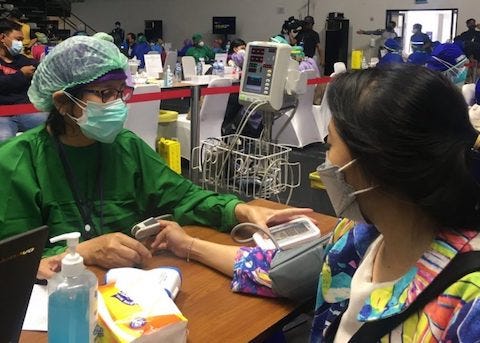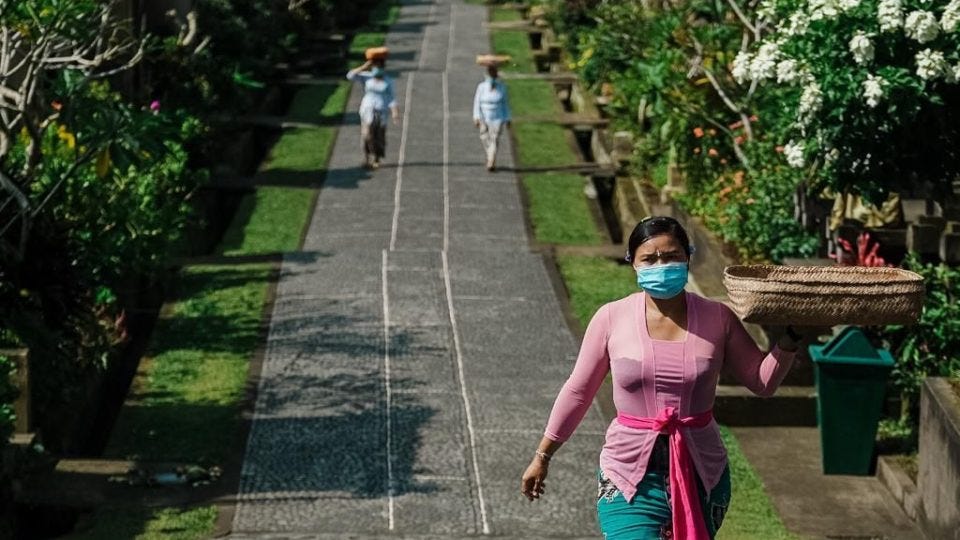Hello Coconauts!
You may have noticed, by the changes in our logo and general appearance, that Indonesia Intelligencer has undergone a rebrand as we seek to make our content as easy on your eyes as possible. A shout-out to our amazing (and Indonesian!) graphic designer Eugenia Clara for leading the transformation. You can check out her other works here.
To celebrate the occasion, we’re making this edition of Indonesia Intelligencer free to read for all.
A note to our loyal subscribers: we are publishing next week’s exclusive edition of the newsletter a day early on Thursday out of respect for Good Friday.
And now, let’s get into the top stories on business, economy, COVID-19 and more from across the archipelago, with the hottest topic this week, perhaps understandably, being a proposed religiously-motivated pay cut for all government workers in Indonesia.
Until next week!
COVID-19
The 1%
On March 23, Indonesia had fully inoculated 2.7 million of its citizens, roughly 1 percent of its total population. Ever since the country began its mass vaccination program in mid-January, the daily vaccination rate continues to gradually climb, though still below the targeted 1 million shots per day due to limited supply.
The government, who proudly pointed out that Indonesia has vaccinated more people than the likes of Singapore and the UAE, is adamant that it will meet the daily vaccination rate target in order to fully inoculate 181 million people — the number required to trigger herd immunity — by early 2022.
As of March 25, 6,389,837 people have received the first of two required doses of the vaccine, while 2,941,016 have received the second.
New shipments
And the vaccines continue to arrive. On March 25, Indonesia received a shipment of 16 million doses of the CoronaVac vaccine in bulk form from Chinese pharmaceutical firm Sinovac. In seven shipments since December, Indonesia has received 53.5 million bulk doses from Sinovac, which are processed locally.
Indonesia is also expecting 4.6 million ready-to-use doses of the AstraZeneca vaccine — the rollout of which was temporarily suspended due to blood clot fears — by the end of March, having already received 1.1 million doses earlier in the month.
Declining death rate
Indonesia, which regularly recorded over 300 deaths per day at the outbreak’s peak in January, has been seeing around 150 deaths per day over the past week, which health authorities say is at least partly attributable to vaccination.
The COVID-19 Task Force said Indonesia’s declining death rate comes amid a global uptrend over the past couple of weeks.
As of March 25, Indonesia has recorded 1,482,559 cases, including 1,317,199 recoveries and 40,081 deaths. The number of active cases stood at 125,279.
Recommended read
‘There’s no virus here’: An epic vaccine race against all odds in Indonesia (The Washington Post)
But the first phase of the Sinovac drive in Aceh, the westernmost province of 5 million, has been derailed by misinformation, mistrust and geographical and practical constraints. Aceh and its poor infrastructure have been stretched thin, even with creative solutions such as retrofitting fishery trucks into cold-storage vehicles capable of distributing vaccine doses.
Business and the economy
Brothers and sisters in alms
Indonesia’s National Zakat Agency (Baznas) has proposed a 2.5 percent pay deduction for all Muslim civil servants, police officers, and military personnel, which would go toward their annual almsgiving obligatory under Islamic law. The agency could collect up to IDR7.6 trillion (US$527 billion) annually, which would be distributed to the needy.
Baznas said the proposal is all but approved by President Joko Widodo, who is expected to issue a Presidential Decree to legalize the policy in time for this year’s Ramadan, which is expected to fall on April 12.
The Institute for Development of Economics and Finance (INDEF) is wary about the proposal, saying that it would take away the option for Muslim workers to choose to disregard their religious duties over financial obligations and needs.
Should the policy be ratified, experts say that those affected should get income tax breaks in the name of fairness.
Deep in debt
President Joko Widodo’s administration is going to leave behind IDR10,000 trillion (US$693.4 billion) of external debt when his term concludes in 2024, a senior economist at INDEF projected, with the figure mostly comprising loans by the central government and state-owned enterprises.
Indonesia’s external debt has climbed annually under Jokowi’s tenure, with his predecessor Susilo Bambang Yudhoyono leaving behind IDR3,200 trillion (US$221.9 billion) in debt in 2014.
INDEF says Jokowi’s administration’s spending has mostly gone unchecked and unchallenged by the House of Parliament (DPR), in which the government has the vast majority of seats.
Optimism ahead
Bank Indonesia says measures to revitalize the pandemic-battered economy, such as removal of down payments, cuts in taxes for property and automotive sectors, are already yielding dividends due to increased household spending.
The central bank is projecting the national economy to grow between 4.3 percent and 5.3 percent this year, after it shrunk by 1.5 percent last year — the first annual economic contraction in 20 years.
It’s also confident that Indonesia’s economic recovery will not be disrupted by recent capital outflows, which were triggered by uneven economic recovery globally and rising US bond yields.
Charging up EV potential
The Ministry of State-owned Enterprises today officially announced the imminent launch of the Indonesian Battery Corporation (IBC), a holding company comprising state firms Mining Industry Indonesia, Pertamina, PLN, and Antam, all of which have equal stake in the consortium.
IBC will oversee the entire production chain of electric vehicle (EV) batteries in Indonesia. It signals the government’s drive to turn Indonesia into a top battery maker for electric vehicles (EV) in the coming years, taking advantage of the country’s abundance of nickel reserves.
IBC is expected to officially launch in the first half of 2021.
UAE money
The United Arab Emirates (UAE) has become the largest anchor investor in Indonesia’s sovereign wealth fund, the Indonesian Investment Authority (INA), after the Gulf nation announced it is injecting US$10 billion into the fund.
The UAE says it would focus its investment in Indonesia's strategic sectors, such as infrastructure, roads, ports, tourism, and agriculture, in line with INA’s general directive to fund projects that promote economic growth.
Other foreign backers of Indonesia’s sovereign wealth fund include Japan, who has committed US$4 billion, and the US and Canada, who have each committed US$2 billion.
MNC on Nasdaq
The video streaming and broadband subsidiary of Indonesian media conglomerate MNC group has merged with special purpose acquisition company (SPAC) Malacca Straits Acquisition with the aim of raising US$130 million through a listing on the US Nasdaq exchange.
MNC hopes the listing will propel its streaming services to compete with the likes of Netflix, Disney+, and Viu, all of which are popular in Indonesia.
Recommended reads
Work from a Bali beach: Indonesia plans digital nomad visa to boost its coronavirus-hit tourism sector (South China Morning Post)
Digital nomads like Clarke have become a new target market in Indonesia’s plans to revive its pandemic-hit, US$63 billion tourism sector. To prop up Bali’s status as a digital nomad hub, Southeast Asia’s biggest economy plans to introduce a new type of long-term visa, which lasts for five years and will enable foreigners to live and work in the country without a work permit.
Why is Indonesia so slow in transitioning to renewable energy? (The Jakarta Post)
Renewable sources are still not the main choice for energy in Indonesia. Coal still dominates in the energy mix for electricity, accounting for 66.3 percent of the total power generated in 2019. Meanwhile, renewable energy only contributed 15.6 percent in 2019, decreasing slightly from 16 percent in 2018.
Indonesian companies, too, are cashing in on K-pop. E-commerce company Tokopedia has hired South Korean boy band BTS and popular female group Blackpink as brand ambassadors, a move which helped it regain its position as the country's most visited e-commerce platform, nudging out Singaporean conglomerate Sea Group's Shopee.
Sea's move into food delivery and financial services in Indonesia threatens its regional rivals (The Business Times)
In front of an open-air Jakarta restaurant, delivery drivers clad in the orange colours of South-east Asia tech group Sea wait for orders next to the green-jacketed riders of market leaders Gojek and Grab, in what has become the latest battleground for tech supremacy in the region.
Across the archipelago
Puppets not for begging
The Jakarta provincial government is banning the use of ondel-ondel by street performers and buskers, arguing that the large (and at times terrifying) puppet figures should remain a cultural icon in the capital.
Once reserved mainly for festivals or to welcome important guests, these days ondel-ondel are often used as props for street performers, and the giant Batavian puppets have become more associated with begging than with tradition.
Mudik off
Even though the Transportation Ministry said it would not ban mudik this year (see last week’s newsletter), the Coordinating Human Development and Culture Ministry today moved to ban the upcoming annual Eid homecoming tradition under the direction of President Jokowi.
The government says it will not another COVID-19 case spike, urging citizens to refrain from traveling for Eid, which is expected to fall on May 13-14.
Bills, bills, bills
The House of Parliament (DPR) has finalized its list of 33 priority bills to be discussed in the 2021 National Legislative Program (Prolegnas). In what came as a pleasant surprise, the Eradication of Sexual Violence Bill (RUU-PKS) was included in the list following years of exclusion.
Other bills that were included were the personal data protection bill, domestic workers protection bill, and a bill on prohibition of alcoholic beverages.
Top Coconuts Jakarta stories this week
Indonesian adult model Cynthiara Alona arrested over ‘prostitution hotel’
Man who jumped from Ambassador Mall apartment killed himself over stock trading losses: Police
Top Coconuts Bali stories this week







